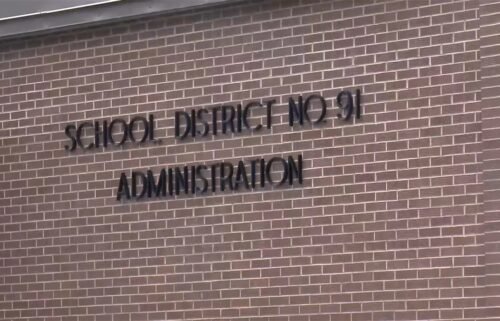These are alternatives to teacher licensing requirements across 16 states
Ground Picture // Shutterstock
These are alternatives to teacher licensing requirements across 16 states
Group of school kids sitting and listening to teacher in classroom.
The United States was already facing a critical shortage of teachers before COVID-19 brought the world to a screeching halt; the pandemic only exacerbated the problem.
To address this, many states are testing out alternative programs that loosen the requirements for obtaining teaching licensure, including considering sufficient education or internship experience in lieu of sitting for and passing a qualification exam. Some criticize these loopholes for supposedly degrading the quality of public education. However, there are a variety of potential benefits that come with introducing nontraditional routes to becoming a teacher.
Alternative pathway programs could help address teacher shortages in critical specialized areas, including foreign languages and special education. They could lead to teacher preparation that emphasizes learning to teach in practical settings rather than focusing so heavily on theory. They could also help diversify teaching staff by bringing in people of varied educational and social backgrounds, thus leading to an education system better equipped to address unique variations among students.
Such programs could pave the way for expanding routes to teaching licensure even further. For instance, Florida is the only state so far to consider military experience in lieu of and equivalent to a teaching degree.
TeacherCertification.com collected data on states that allow alternatives to standardized teacher licensing tests. These states are spread throughout the U.S., have diverse socioeconomic statuses, and have largely different political leanings—indicating that the shortage of teachers is due to universal stressors rather than legislative shortfalls or infrastructural differences.
Read on to learn about alternative paths some states are offering aspiring educators and what it could mean for the future of the teaching workforce.
![]()
Monkey Business Images // Shutterstock
No teacher licensure tests required
Teacher helping high school students with technology.
– State(s) that use this alternative: Iowa
Iowa has removed the requirement for teacher licensure tests entirely. On June 13, 2022, Iowa Governor Kim Reynolds formalized HF2081, which removed the requirement for teachers to undergo an assessment upon completing a preparation program. The relatively recent development was meant to address the severe lack of educators in the state—as of Jan. 31, 2022, there were more than 1,000 teaching positions open.
To become an educator in Iowa, prospective teachers can use either of two alternative licensure programs, which are only available for teaching at the high school level. Rather than pass an exam, candidates can take a minimum amount of courses in teaching methods before spending a year in a classroom as an intern.
Monkey Business Images // Shutterstock
Teacher licensure tests only for reading
Female teacher reading story to group of elementary students.
– State(s) that use this alternative: New Mexico, Montana, Maine, and Wisconsin
Citing the prohibitive costs—around $700 total in New Mexico, for example—of taking multiple licensure tests to become a teacher, these states only require testing to teach elementary-level reading.
Additionally, in Wisconsin, alternative ways of obtaining a teaching license aim to help fill gaps in subject areas lacking educators, such as the STEM fields. Candidates must have a bachelor’s degree but can then prove their teaching competency via practical work experience.
In Montana and New Mexico, candidates can choose to complete a non-content-specific portfolio in lieu of taking a test. Additionally, prospective teachers in Montana can also skip the test if they had a 3.0 GPA or higher while completing teaching-related coursework.
Monkey Business Images // Shutterstock
Teacher licensure tests with some flexibility
Teacher and pupils using flower shapes on table.
– State(s) that use this alternative: Alabama, Delaware, Missouri, and Colorado
In these states, taking a licensure exam is a must—but not necessarily passing with flying colors. In Alabama, those who fail their test within a certain narrow margin are able to submit alternative evidence to qualify for a teaching license.
In Delaware, otherwise-qualified educators will still receive their licenses if they make no more than two standard errors below passing. Missouri has adopted the same rule, albeit with a stricter allowance of only one standard error below passing. In Colorado, a still-developing program will allow aspiring educators to submit a portfolio of work or transcripts above a certain caliber in lieu of a passing exam score.
Rawpixel.com // Shutterstock
College degree in teaching subject
Group of students in laboratory.
– State(s) that use this alternative: West Virginia, Arizona, California, Hawaii, Oregon, and Utah
These states waived the need for examination in elementary content for those who have already achieved a degree in their teaching area. Former Arizona Gov. Doug Ducey signed legislation in July 2022 allowing anyone with five years of experience in a subject area to teach that subject, a move that was commended for recognizing the high debt that many take on in order to become teachers. The move is also expected to address teaching shortages in niche areas, such as special education and foreign languages.
In Utah, a full degree is not even necessary: Candidates who have completed coursework in their teaching subject without necessarily obtaining a finished degree may be eligible for exemptions. However, those who are hired must undergo three years of mentoring with a “master teacher” as designated by the school at which they are teaching in order to become licensed.
Anton Gvozdikov // Shutterstock
Allowing districts to apply for waivers
Audience listening to lecturer.
– State(s) that use this alternative: New Jersey
New Jersey is grappling with a teacher shortage due to both the COVID-19 pandemic and a plethora of aging educators moving into retirement. To address this, the state just finalized a five-year pilot that will allow individual districts to apply to the state for approval to hire new teachers directly, waiving either the minimum content test score or GPA requirements.
Districts must submit alternative evidence that prospective teachers are qualified for their position, such as recommendations or evaluations from previous practical teaching experience. However, such hires will only be granted limited certificates of eligibility. Applications from districts are expected to be processed within just five days, indicating the urgency with which the state views the teaching shortage.
This story originally appeared on TeacherCertification.com and was produced and
distributed in partnership with Stacker Studio.











